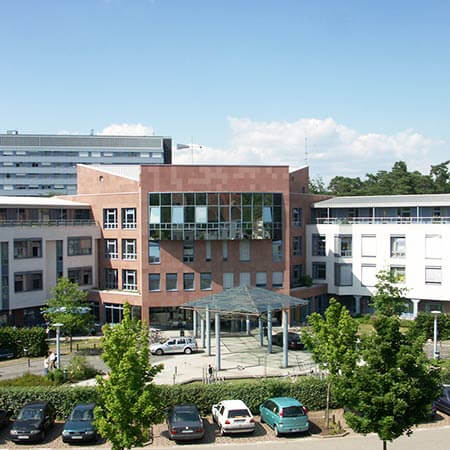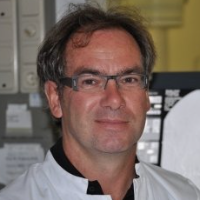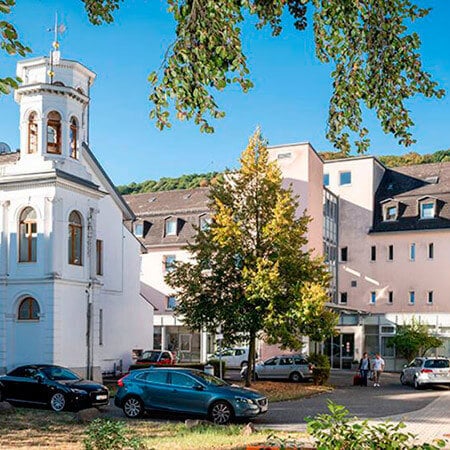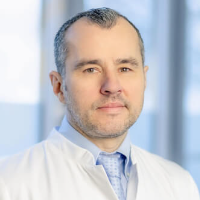Liver Cancer Treatment by Percutaneous Embolization (coiling)
Treatment prices are regulated by national law of the corresponding countries, but can also include additional hospital coefficients. In order to receive the individual cost calculation, please send us the request and medical records.

Department of Interventional Neuroradiology
The Department of Interventional Neuroradiology offers the full range of services in the areas of its specialization. The medical facility provides imaging diagnostics and low-traumatic image-guided interventional treatment of nervous system diseases. The department's specialists have rich experience and exceptional professional skills in the field of interventional procedures for acute and chronic vascular diseases, such as ischemic strokes, brain hemorrhages, cerebral artery stenosis, brain aneurysms, and vascular malformations. The department's neuroradiologists cooperate closely with neurologists and neurosurgeons so that each patient receives an optimal treatment regimen based on the expert opinions of the specialists. The department's medical team has state-of-the-art computed tomography (CT), magnetic resonance imaging (MRI), and MR angiography systems that are actively used for diagnosing patients and therapeutic procedures. Medical care is provided in compliance with current clinical protocols. The department also offers many outpatient medical services, which is an advantage for many patients.




Department of Adult and Pediatric Diagnostic, Interventional Radiology
The Department of Adult and Pediatric Diagnostic, Interventional Radiology offers all modern methods of high-precision imaging diagnostics and minimally invasive imaging-guided therapeutic procedures. The department meets all radiation protection standards, which are especially important in the diagnostics of children and adolescents. The basis of successful clinical practice of the medical facility is a progressive technological base and the best highly qualified specialists.



Department of Interventional Radiology
The Department of Interventional Radiology offers the full range of modern diagnostic procedures using ionizing radiation, image-guided tissue sampling (biopsy), and minimally invasive therapeutic procedures. Patients may be seen on an inpatient or outpatient basis. To achieve optimal results, the department works closely with specialists in radiation therapy, oncology, neurology, neurosurgery and neuro-oncology, as well as urology, orthopedics, pain management, and palliative care. This collaboration helps ensure an accurate diagnosis and the most effective treatment.




Liver cancer is a malignant tumor of the liver that develops from its structures under the influence of various factors. Percutaneous embolization (coiling) allows depriving the primary tumor and metastases from nutrients due to the blood flow blockage. The procedure is minimally invasive and is associated with lower risks compared to the conventional surgery.
Content
- Overview
- Stages
- Symptoms
- Diagnostics
- Treatment
- Where can I undergo percutaneous embolization (coiling) abroad?
- The cost of treatment abroad
- How can I undergo percutaneous embolization (coiling) abroad?
Overview
Liver cancer is one of the leading causes of death in oncological practice. A liver cancer diagnosis indicates that some healthy cells of this vital organ have turned into tumor cells. Liver cancer can be both primary (that is, it appears and develops directly in the liver), and secondary (in this case, liver cancer appears due to the metastases of other tumors in the body that enter the liver via blood or lymphatic vessels). Liver cancer caused by metastases develops much more often than primary tumors. This is due to the peculiarities of blood circulation and liver function. As a rule, metastatic liver cancer is more dangerous than the primary tumor itself.
Primary liver cancer has the following types: hepatocellular carcinoma, angiosarcoma, hepatoblastoma, hemangiosarcoma, and cholangiocarcinoma.
Liver sarcoma is a rare and dangerous health condition. The tumor develops very quickly, spreading to nearby organs. A feature of sarcomas is their occurrence mainly in young people and children. In particular, angiosarcoma of the liver is a rare form of a malignant tumor. The neoplasm has an aggressive course, with very rapid growth, and a high frequency of metastasizing.
Cholangiocarcinoma, or bile duct cancer, can develop both in the area of the liver and outside the organ. A tumor can form anywhere in the bile duct. Depending on the localization of the formation, there are three groups of neoplasms, including cancer of the intrahepatic ducts, cancer of the bile duct in the area of the porta hepatis, and cancer of the distal bile ducts.
The causes and mechanisms of the development of liver cancer have not been sufficiently studied yet. The influence of geographic location, climate, diet, and certain medications were studied. In patients with alcoholism, primary hepatic cell carcinoma often develops on the background of cirrhosis. Liver cancer can develop at any age, although more often it is found in patients over 40.
Some of the risk factors of developing liver cancer include:
- Chronic hepatitis B and C (hepatitis B and C are detected in 80% of patients with liver cancer)
- Cirrhosis of the liver
- Alcoholic and drug hepatitis
- Regular intake of carcinogens in food
- Cholelithiasis
Stages
The first stage of liver cancer involves the formation of the tumor itself. At this stage the tumor has not had time to spread, to penetrate the vessels. At this stage, liver cancer has no metastases. It is rather difficult to diagnose a tumor at this stage of liver cancer, since the symptoms are virtually absent. For this reason, it is advised to undergo a full medical examination every six months.
At the second stage of liver cancer, the tumor increases in size significantly and affects the blood vessels. Pain sensations appear which increase even with minor loads.
The third stage of liver cancer is more severe. This stage of the development of oncology has very poor perspectives for treatment. It is subdivided into three stages: 3A (the tumor has grown around the hepatic vein), 3B (liver cancer has spread beyond the liver), 3C (malignant cells have spread to the lymph nodes; liver cancer has metastasized to other organs).
The fourth stage of liver cancer is the most severe since this is the advanced stage. Usually, at this stage, the tumor grows to half of the size of the liver or bigger, and metastases spread throughout the body.
Symptoms
Liver cancer has certain symptoms. It is true though, that at the early stages it is extremely difficult to determine. The primary and secondary types of malignant tumors have identical signs of liver cancer. Therefore, if this disease is diagnosed, a mandatory examination of other organs of the abdominal cavity is carried out.
The symptoms of liver cancer are non-specific and usually can be easily confused with other diseases of this organ (with gallstone disease or exacerbation of chronic hepatitis). Still, at early stages patients can experience:
- Bloating and discomfort
- Diarrhea or constipation
- Nausea, which may be accompanied by vomiting (this is one of the most common symptoms in liver cancer)
- Decreased appetite
- Constant feeling of tiredness and malaise
- Chills and fever are sometimes the signs of liver cancer
These are the most common symptoms of liver cancer.
Diagnostics
In the best hospitals in the world modern methods of diagnosing liver cancer that meet international medical standards are used such as:
- Ultrasound scanning. Ultrasound examination can detect the tumor and in some cases suggest its type.
- Tumor biopsy. Tumor biopsy is the most reliable method for diagnosing liver cancer. As a rule, a thin long needle is used, which is inserted through the skin directly into the tumor area under the control of an ultrasound monitoring. If cancer cells are found during the examination of the harvested tissue under a microscope, the diagnosis of liver cancer is confirmed.
- Computed tomography (CT). Computed tomography (CT) is very effective in diagnosing liver tumors, as it can detect even small neoplasms that are invisible during the ultrasound scanning. To improve the image informativeness, a CT scan with contrast is sometimes performed. A contrast agent is injected intravenously, which makes it possible for specialists to study the location of blood vessels in the liver. During computed tomography, the machine takes images of liver sections, which allows specialists to carefully examine the structure of the organ and identify even small tumors.
- Laparoscopy. The laparoscopic method allows an accurate and correct diagnosis making. The method is sparing, fast, and painless for patients. Through a small incision, under short-term anesthesia, the doctor inserts a special device into the abdominal cavity. He examines the tumor on the monitor, and takes a piece of tissue for histological examination.
Treatment
Surgical treatments are the only methods for the improvement of long-term survival in patients with liver cancer. However, by the time a malignant tumor is diagnosed, radical removal is possible in 5-15% of patients, in other cases only palliative treatments are performed. Tumor recurrence within 3-5 years after resection is observed in 70-90% of patients. The effectiveness of systemic antitumor chemotherapy for inoperable liver cancer does not exceed 20% with a survival rate of 3-4 months. With intravenous administration of a chemotherapy drug, the therapeutic concentration is achieved only for a short time, and in some cases it does not have the necessary effect on tumor cells. The significant liver damage, the difficulty of achieving a therapeutic concentration of the chemotherapy drug in the affected areas, and the high toxicity of anticancer drugs put question on the success of traditional systemic drug chemotherapy for liver cancer treatment.
Achievements of X-ray endovascular surgery allow using the modern methods of selective embolization to treat liver cancer with the help of introducing special devices (coils) directly into a vessel that is feeding a malignant tumor.
Embolization procedure for liver cancer treatment is the modern minimally invasive interventional method of treatment.
After performing local anesthesia, special endovascular catheters are inserted directly into the vessels of the liver that feed the tumor under the control of an angiography (a modern digital X-ray examination). After that, the blood flow in these vessels is blocked by introducing coils through the lumen of the catheter. After the cessation of blood supply, the tumor stops its further growth and decreases in size.
Besides, coils introduced through the lumen of the catheter directly into the tumor vessels have demonstrated the effectiveness in liver cancer treatment according to the latest clinical trials.
Embolization procedure is an effective minimally invasive method for liver cancer treatment that is considered an alternative to conventional surgery. Moreover, when large single and multiple liver tumors are detected, embolization procedure is the only possible cancer treatment method, since resection of large areas of the liver is associated with high risks and is often not possible.
The effectiveness of the embolization procedure for liver cancer treatment is based on the peculiarities of the blood supply to liver tumors. Normal liver parenchyma has a blood supply from the portal vein and from the hepatic artery. Up to 95% of the tumor nodes have an intense arterial blood supply. This makes it possible to selectively make injections directly into the tumor, significantly reducing their effect on healthy liver cells.
Embolization for liver cancer treatment is a modern promising surgical method of treatment that refers to high-tech types of cancer care. Long-term results of liver cancer treatment with embolization are assessed as satisfactory. Most patients show positive results, confirmed by the diagnostic methods. The low incidence of complications and low toxicity allow performing embolization in debilitated patients with various malignant liver tumors.
Where can I undergo percutaneous embolization (coiling) abroad?
Health tourism is becoming more and more popular these days, as medicine abroad often ensures a much better quality of percutaneous embolization (coiling).
The following hospitals show the best success rates in percutaneous embolization (coiling):
- University Hospital Saarland Homburg, Germany
- Memorial Bahcelievler Hospital Istanbul, Turkey
- University Hospital Halle (Saale), Germany
- University Hospital Muenster, Germany
- University Hospital Oldenburg, Germany
You can find more information about the hospitals on the Booking Health website.
The cost of treatment abroad
The prices in hospitals listed on the Booking Health website are relatively low. With Booking Health, you can undergo percutaneous embolization (coiling) at an affordable price.
The cost of treatment varies, as the price depends on the hospital, the specifics of the disease, and the complexity of its treatment.
The cost of treatment with percutaneous embolization (coiling) or chemoembolization in Germany is 24,200-40,900 EUR.
You might want to consider the cost of possible additional procedures and follow-up care. Therefore, the ultimate cost of treatment may differ from the initial price.
To make sure that the overall cost of treatment is suitable for you, contact us by leaving the request on the Booking Health website.
How can I undergo percutaneous embolization (coiling) abroad?
It is not easy to self-organize any treatment abroad. It requires certain knowledge and expertise. Thus, it is safer, easier, and less stressful to use the services of a medical tourism agency.
As the largest and most transparent medical tourism agency in the world, Booking Health has up-to-date information about percutaneous embolization (coiling) in the best hospitals. We will help you select the right clinic taking into account your wishes for treatment.
We want to help you and take on all the troubles. You can be free of unnecessary stress, while Booking Health takes care of all organizational issues regarding the treatment. Our services are aimed at undergoing percutaneous embolization (coiling) safely and successfully.
Health tourism can be easy! All you need to do is to leave a request on the Booking Health website, and our manager will contact you shortly.
Authors:
The article was edited by medical experts, board certified doctors Dr. Nadezhda Ivanisova and Dr. Vadim Zhiliuk. For the treatment of the conditions referred to in the article, you must consult a doctor; the information in the article is not intended for self-medication!
Our editorial policy, which details our commitment to accuracy and transparency, is available here. Click this link to review our policies.

